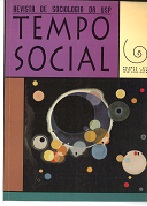Michel Foucault: parrhesia and cynicism
DOI:
https://doi.org/10.1590/ts.v8i1.86285Keywords:
Games of truth, Parrhesia, Cynicism, Subject, LibertyAbstract
From the last course ministered in the Collège de France (january/march, 1984), Foucault intends to analyse the historicity of cynicism in the Greek-Roman antiquity and its importance in the modern world. The importance of this article lays in the new direction of Foucaults’ researches, focused on the history of thought, from the idea of games of truth. The parrhesia concept – brave act of true saying – is the central issue of the theorical core of the transhistoricity of the criticism of the cynical reason, allowing enlighten the ethical question of the free subject, known as empty form always ready to be an actual person on the social ground.Downloads
References
CATONNÉ, Jean-Philippe. (1994) A sexualidade, ontem e hoje. São Paulo, Cortez.
FOUCAULT, Michel. (1983) L’écriture de soi. Corps écrit, s/l, p. 3-23.
FOUCAULT, Michel. (1984a) L’éthique du souci de soi comme pratique de liberté. Concordia Revista Internacional de Filosofia. (Internationale Zeitschriff für Philosophie), s/1, p. 99-116.
FOUCAULT, Michel. (1984b) L’usage des plaisirs. Paris, Gallimard.
PLATÃO. (1972a) Apologia de Sócrates. Coleção Os Pensadores II. São Paulo, Abril.
PLATÃO. (1972b) Fédon. Coleção Os Pensadores II. São Paulo, Abril.
WELLAUSEN, Saly. (1993) A liberdade no pensamento de Michel Foucault. São Paulo, 240 p. Tese (Doutorado). Faculdade de Filosofia, Letras e Ciências Humanas da Universidade de São Paulo.
Downloads
Published
Issue
Section
License
Copyright (c) 1996 Tempo Social

This work is licensed under a Creative Commons Attribution-NonCommercial 4.0 International License.


